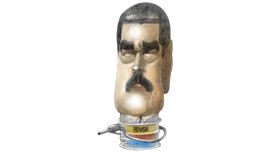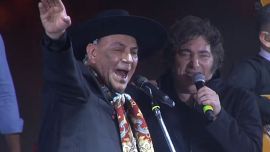Poverty in Argentina rose to 35.4 percent in the first half of the year, the highest officially recorded level since 2001, the INDEC national statistics bureau reported today.
Around 15.8 million Argentines are now considered poor, INDEC's data indicates, a rise of 1.5 million people in six months. At the end of 2018, 32 percent of Argentines were said to be living in poverty.
Some 25.4 of households across the country cannot afford their basic food needs, said the bureau, which is headed by Jorge Todesca.
Some of Argentina's youngest are among those hit the hardest. In the first half of 2019, poverty among those aged under 15 reached 52.6 percent. Among those aged 15 to 29, the level drops to 42.3 percent. For those aged between 30 and 64, the index touches 30.4 percent, while among the retired (those over 65), poverty affects 10.4 percent of individuals.
The data, however, does not include the most recent devaluation of the peso in August, when the national currency dropped in value by 20 percent against the dollar, in the wake of the results of the PASO primaries. Data showing that shift is expected to be released in March 2020. President Mauricio Macri lost the primaries to Peronist hopeful Alberto Fernández, sparking a run on Argentines bonds and the peso.
This new data shows that 3.25 million people have slipped into poverty over the last 12 months, with the figure rising 8.1 percentage points in just a year. Those said to be living in extreme poverty – i.e. those who cannot meet their minimum needs – has increased from 6.7 percent to 7.7 percent over the last six months. One year ago, the figure stood at just 4.9 percent.
Inflation this calendar year is expected to close at around 55 percent, according to most experts, some of whom believe poverty will rise to close to 37 percent by the end of the year.
"The devaluation [of 20 percent since August], which occurred after this measurement by INDEC, is going to start impacting and, above all, in the next three months, it will generate another rise in poverty," said sociologist Daniel Schteingart from the Universidad de San Martín.
'It hurts'
President Mauricio Macri, who is campaigning for re-election in the upcoming October 27 general elections, had anticipated the disappointing numbers earlier in the day, admitting that "unfortunately [the data] will reflect the situation we are living in."
"Although it hurts, we must look ahead," he added.
Fernández, the Frente de Todos presidential candidate, criticised the numbers, saying that during Macri's tenure "the only thing generated is the poor."
Speaking on Monday, Health and Social Development Minister Carolina Stanley said the government was focused on "reducing inflation."
"Reducing inflation is a key factor that we have ahead of us," said the national official, flanked at a press conference by Production and Labour Minister Dante Sica.
Stanley said the Macri administration was "constantly working" to help the nation's poorest.
"The results are not what we expected," she admitted.
For his part, Sica said that the Casa Rosada carries out "daily self-criticism," adding that officials were trying to "correct mistakes and overcome them."
"We continue working to improve structural conditions. When the new indexes come out we should see an improvement, because these structural situations, which were not measured before and are now measured," he added.
Breakdown
Projecting the population out to the national population, INDEC's data shows that 14.4 million individuals living in urban populations are poor, a rise from 11.15 million a year ago.
In Greater Buenos Aires, nearly 4 in 10 are considered poor, with the index reaching 39.8 percent. In Buenos Aires City, poverty affects 14.3 percent.
Concordia, in Entre Ríos Province, recorded the highest level of poverty, reaching 52.9 percent in the first half of the year, according to INDEC.
In the cities of Santiago del Estero, Corrientes and Gran Resistencia poverty affects more than 40 percent of the population, the agency revealed.
Expanding the projection out to include the rural population reveals that 15.8 million Argentines are living in poverty.
During his successful election campaign in 2015, President Macri famously promised to deliver "zero poverty" in Argentina, adding that his administration should be judged by the evolution of the poverty index.
In the latter half of 2017, poverty had dropped to 25.7 percent. Argentina's economy, however, has since slipped into recession and purchasing power has declined amid soaring inflation.
A full comparison with the Kirchnerite years is not possible, given that INDEC's statistics were unreliable under former president Cristina Fernández de Kirchner.
– TIMES/NA/AFP


























Comments